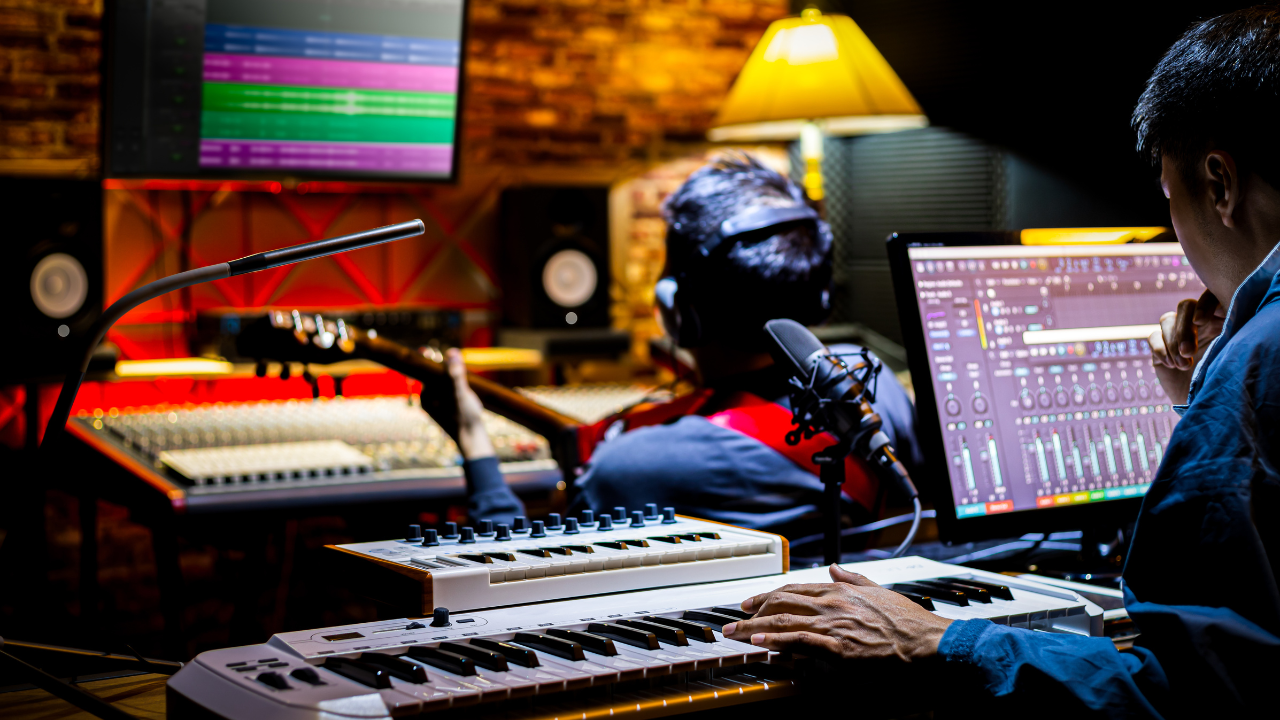What is Music Production?

Music production is the process of turning a musical idea into recorded music that can be listened to by anyone. It could be for a song, film, game or other visual media. It entails combining sounds from various instruments, recording gadgets, and software applications to produce sound recordings. First the songs are written and then recorded and edited with the help of an audio engineer. Songs are then edited, mixed, mastered, and finally uploaded for distribution.
Songwriting
In order for a producer to create a recording, he or she must begin with composing, which is the process of writing and arranging songs. Then the producer listens to the song before choosing which songs will appear on the final track listing as well as how they should be sequenced and arranged. Music producers take responsibility for finding a song’s original melody and its underlying chord progressions as well as for shepherding its final recording through production. Unless they play and sing everything themselves, they connect with musicians and singers to perform on the track and enlist engineers to capture those performances. Finally, the producer may have one or more engineers and songwriters listen to playback of those recordings during the pre-production phase before issuing revisions for the song structure and instrumentation if necessary.

Recording
After the song is ready for production the producer records the song with an audio engineer who adjusts the signal to ensure that all instruments and vocals are heard clearly. The first round of recordings are called the “bed tracks'' and they lay the foundation for the recording. In beatmaking & electronic music productions the bed tracks will typically be the foundational drum beat and bass line programming which helps to define the genre. For a live band recording the whole band would typically play together and try to get a great group take. The producer would then decide if overdubs are needed. Overdubs are additional layered recordings of separated instruments added to the bed tracks. Once everything has been recorded, producers will listen back and decide which songs will make it on the final track listing.
Editing
Audio Editing is the process of making changes to a recording. It allows a producer or audio engineer to correct pitch or timing mistakes in recorded vocals, correct timing errors on drums, or add alternative lyrics or melodies. Some audio editors also add samples and sound effects to enhance the sound of the recordings. Music producers often use digital audio editing software for this purpose. As well as having more effects than analog equipment, digital software can be accessed from any computer and does not require an expensive studio setup for production. Additionally digital allows for non-linear copy & paste style compositing and editing.

Mixing
Mixing is the process of combining two or more previously recorded isolated instrument tracks (sometimes 10, 20, 50 or more) down to a single stereo audio file that can be distributed to listeners for playback through their systems. The process usually begins by selecting one musical instrument (e.g., bass) and then adding in the rest of the instruments one at a time, maintaining a good volume level balance. The mix engineer uses equalization (EQ) and compression techniques to make sure the each instrument has a clear presence in the mix and that nothing sounds out of place or too loud or too soft. They then engage in creative panning techniques—such as panning left and right, or using creative phase cancellation to create spatial effects. Next they apply delay and reverb to give the music a sense of space and dimension. Volume automation is the final stage of mixing to make sure everything (especially the voice) can be heard at all times.
Mastering
The finished mixes usually pass through another set of ears belonging to a mastering engineer before being distributed to the public. The song levels are finely adjusted to compete with the current mastering trends while adhering to popular streaming service recommended maximum peak and average levels. Ideally the mastering engineer makes sure the song sounds great wherever it is heard from headphones to car stereos to club PA systems.
Conclusion
Music production is the process of turning the song idea in your head into an audio recording that anyone can stream or download.

Futch - Music Production Coach, Ableton Certified Trainer
Write your first song or beat with this FREE Ableton Live course. No experience necessary.





